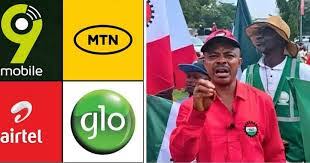The President of the Committee for the Defence of Human Rights (CDHR), Debo Adeniran, has said that the group will not join the Nigeria Labour Congress (NLC) in protest over the increase in telecom tariffs.
Speaking at a press conference on the state of the nation in Lagos, Adeniran said the group has decided not to join the NLC because of its refusal to take action during the removal of fuel subsidy and increase in the electricity tariffs.
Adeniran said Nigerians expected the NLC to act but decided to side with the government against the people they are supposed to protect.
He said: “With the recent approval granted the telecommunication companies to increase tariffs by the regulatory agency, consumers will have to pay more for services such as calls, data, and SMS, which could lead to reduced usage, especially among low-income groups.
“Increased tariffs may widen the gap between those who can afford telecom services and those who cannot, further excluding marginalized communities.
“Increased tariffs may widen the gap between those who can afford telecom services and those who cannot, further excluding marginalized communities (Digital Divide).
“Higher costs could discourage new users from adopting internet services, slowing the growth of internet penetration.
However, higher revenues for the Telcos could lead to more investments in infrastructure, network upgrades, and service expansion, especially in underserved areas.
“We are aware that the Nigeria Labour Congress has declared a nationwide protest over the recent hike in telecommunications tariffs.
“The protest is scheduled to take place on Tuesday, February 4, 2025, as stated in a communiqué issued after the National Administrative Council meeting of the NLC yesterday.
“We have decided not to join the protest because we had earlier called for the reversal of the fuel subsidy removal and the increase in electricity tariffs which is now having a ripple effect on everyone both individuals and businesses.
“Hence it will not be wise to protest the increase in telecommunication tariff as the Telcos are also under pressure to maintain their base stations with huge amounts of money required to fuel their giant generators.
“So they necessarily have to pass the cost to their subscribers in the form of higher tariff. We believe that what we should demand from the Telcos is improved service delivery, in terms of reduction in dropped calls, poor data quality, and improved network connectivity.”
According to Adeniran, the removal of fuel subsidies, though necessary for fiscal stability, has led to increased living costs for the average Nigerian.
“Rising inflation, coupled with stagnant wages, has pushed many families into deeper poverty. While palliative measures have been introduced, they remain insufficient.
“Recently, the Federal Government announced plans to distribute N75,000 cash transfers to an estimated 70 million ‘poorest of the poor’ Nigerians, whilst this is not the first time the federal government will be doing this, the impacts have not been felt on the citizens.
The criteria being used to select the so-called poorest of the poor is still shrouded in secrecy. We would like to use this medium to call on the government to implement more robust policies to cushion the economic effects on vulnerable populations.
“Reduction in the prices of fuel, cooking gas and transportation would make more significant impacts in the lives of the people than endless arbitrary cash transfers to the citizens,” he said.















